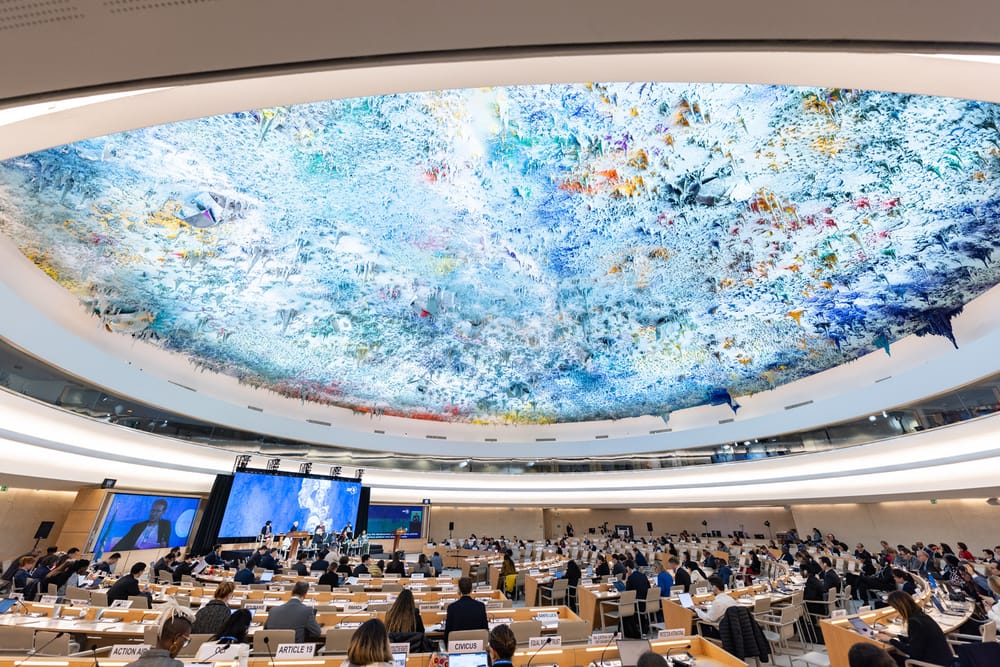By Andrew Clapham
In 2023 Hugo Slim, writing for the Geneva Policy Outlook, called for new rules to regulate global economic warfare. He is concerned about the economic effects that war has beyond the warring parties. He is right to highlight this issue; and he is right to admit that it will “take years for states to reach an agreement” on any new Protocol or principle. His solution? A turn to human rights law.
For a long time, human rights law was seen as inappropriate, even inapplicable, in times of armed conflict. Crudely put: human rights law was seen as the law for times of peace. Wartime, it is assumed, should be regulated by international humanitarian law. Added to this, some humanitarians saw human rights as somehow less universal than international humanitarian law, and somehow more political. The human rights debate at the General Assembly and the UN Human Rights Commission was seen as political and divisive; and human rights were said to be impracticable, even too complex, to be applied by ‘ordinary soldiers’. I have heard it said that introducing human rights thinking into the battlefield would make soldiers hesitate before killing and putting their own lives in danger. I am told that soldiers need to be told who to target based on their status as combatants, or their direct participation in hostilities, and not be asked to think about what is necessary, proportionate, arbitrary, unreasonable, unjust or inappropriate.
One can even detect hesitation from the side of human rights bodies themselves. Having been faced with defendant states arguing that human rights courts have no jurisdiction over the laws of war, and that facts cannot be found in the fog of war, such bodies fear that complaints about loss of life and property destruction will place unbearable strains on their complaints procedures. The idea is taking root that human rights bodies and Courts are ill-equipped to make evidence-based findings based on war-like situations such as the conflicts between Russia and Georgia, and Russia and Ukraine. The European Court has famously started to limit its jurisdiction by reference to a new concept known as the “context of chaos”.
On the one hand, one could just see this as states predictably seeking to avoid accountability. On the other hand, the UN Human Rights Council has solidified its monitoring role in times of war, and now regularly considers reports on the human rights situation in times of armed conflict. These reports now often include details on violations of the 1949 Geneva Conventions and other violations of international humanitarian law. This history at the Human Rights Council has been well documented, but it is worth recalling here the crucial step taken in 1991 when the Swiss law professor, Walter Kälin, was appointed by the then UN Human Rights Commission: “to examine the human rights violations committed in occupied Kuwait by the invading and occupying forces of Iraq.” Apart from making it clear that human rights applied to the conduct of the Iraqi army abroad, the resulting report also detailed the violations of international humanitarian law, explaining that the mandate had to be understood as covering “all violations of all guarantees of international law for the protection of individuals relevant to the situation”. Thirty years later, diplomats and others sometimes fail to recall the consensus that surrounded the obvious need for UN human rights bodies to report on violations committed during invasion and occupation.
More recently, the Human Rights Council has decided to establish Commissions of Inquiry to look at armed conflict situations and the attendant violations of the law of war together with related war crimes. For example, the Commission on Ukraine has a mandate to “investigate all alleged violations and abuses of human rights and violations of international humanitarian law, and related crimes”. A long list of similar country mechanisms would include Libya, Sudan, South Sudan, Ethiopia, Lebanon, Colombia, Sri Lanka, Afghanistan, Myanmar, Yemen, and the ongoing Commission to investigate under human rights law and international humanitarian law in ‘the Occupied Palestinian Territory, including East Jerusalem, and in Israel’. In 2023, it seemed inconceivable that unconscionable violence, destruction, massive mobilisations and bombardment in the context of wars such as those in Ukraine and Gaza would not attract scrutiny from the UN’s human rights machinery.
Yet, thinking is just in its infancy when it comes to the particular challenge posed by Hugo Slim: the global economic effects of sanctions and blockades. Commissions of Inquiry tend to focus on the facts surrounding immediate violence, and less on the structures in international law and relations that need to change to ensure that warfare does not, in his words: “violate people’s rights to life, food, health, education and their right to earn a living”.
We should be asking if methods of warfare such as siege and blockade are admissible at all in the 21st century.
I would suggest that it is not enough simply to think about respecting proportionality when it comes to institutions such as blockade and siege. We should be asking if methods of warfare such as siege and blockade are admissible at all in the 21st century. How can starving anyone into submission be countenanced as a method of war when we all agree that torture is no longer acceptable as a matter of human rights? Why are we considering a humanitarian way to impose a siege - when the institution of wartime siege should be defunct in the modern world? We do not today spend time considering rules for ensuring that slavery is exercised under humane conditions.
Thinking more generally about human rights in wartime, we are at ease with the idea that individuals should be able to opt out of military service if they have a conscientious objection to violence of any kind. However, there seems to be less agreement that individuals should be able to opt out of certain unjust wars, enjoy so-called ‘selective’ conscientious objection, or benefit from asylum from prosecution (persecution).
One might also consider the inadequate attention to the rules on the transfers of arms that could be used to commit human rights violations, the horrific effects of certain weapons, and the impact on the rights to health and education when schools and hospitals are destroyed. These topics should not be directed to the silos dealing with disarmament, the arms trade, or the UN specialised agencies. The Geneva-based human rights machinery should reinforce its commitment to the ethos of human rights (in the sense of a serious concern for human dignity). There is plenty of rights-based talk from politicians and diplomats: the right to self-defence, the right to protect borders, the right to eliminate terrorist groups, and the right to protect a ‘way of life’. But these claims have to take into account people’s human rights. In my view, human rights are getting drowned out as talk shifts to global security, humanitarian catastrophe, and war.
The time has come for a serious discussion on the challenges that war poses and the logic of war poses for the enjoyment of human rights. We need to think about an “agenda to protect human rights in war”.
Much has been said about the need to take human rights thinking into the worlds of trade, investment, digital technology, intellectual property, health, and the environment. There are plenty of Geneva-based encounters entitled “Human rights and …”. What I am highlighting here is that the time has come for a serious discussion on the challenges that war poses and the logic of war poses for the enjoyment of human rights. In short, we need to think about an “agenda to protect human rights in war”. The first item on the agenda: the human right to peace.
About the author
Andrew Clapham is Professor of International Law at the Geneva Graduate Institute and the former Director of the Geneva Academy of International Humanitarian Law and Human Rights. He is the author of War (Oxford University Press, 2021).
The opinions expressed in this publication are those of the authors. They do not purport to reflect the opinions or views of the Geneva Policy Outlook or its partner organisations.





